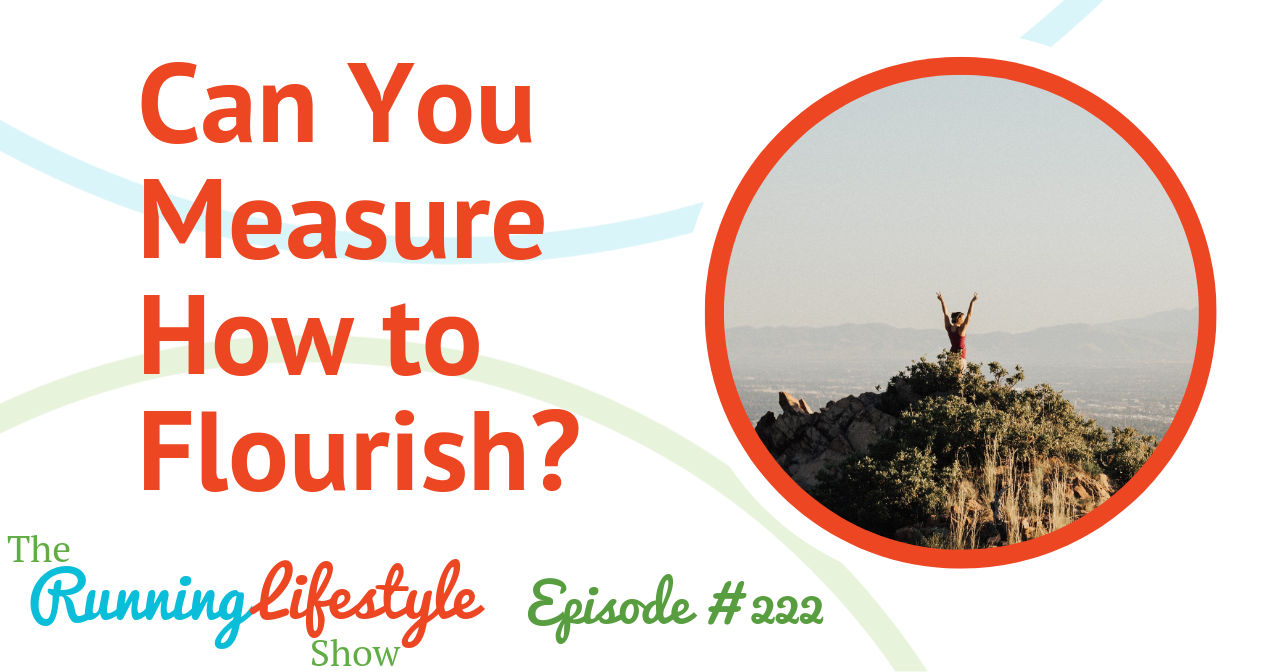222: Can You Measure How to Flourish?
Psychologists use questionnaires, inventories, scales, and statistics to make mental disorder diagnoses, right?
But can you measure flourishing, well-being, and/or happiness in some way?
Yes, you can! There is something called the Flourishing Scale, which Ed Diener and Robert Biswas-Diener created, that gives an idea of positive functioning across many areas that are considered important.
To flourish means to thrive in certain key areas. As a runner, you might like to measure time and distance. So why not try out how to measure key indicators of a flourishing lifestyle?
There are eight measured items that indicate whether or not you’re leading a flourishing life.
But first things first. Are you an optimist? How do you feel about your future individually, about other people’s futures, and the world’s future as a whole? Remember—you know that what you look for, you’ll find.
So are you looking for the positive or the negative? Is the world coming to an end? It’s tricky, because you know that your brain is wired for survival, so you have to outsmart your brain to look for the good.
Now you can’t go all pollyannaish and think everything is good. However, can you see a silver lining in most things?
Next, look at how you are engaging with the world, which is also known as participating. Are you participating in life, or does life seem to be passing you by?
Are you truly interested in the things that you spend the most time (your most valuable resource) doing, and do they give you energy?
You know that the biggest predictor for longevity is the quality of your relationships.
Do your relationships feel rewarding and supportive? Research shows that you ideally have solid, reliable relationships in your life where if you called someone up at 2 a.m. in need, he or she would be there for you.
Do you have relationships that when something really good happens, they celebrate with you? Do the people in your relationships ask follow-up questions and take a genuine interest in you?
Do they help you savor a moment while sharing some good news? Do you have any rituals when celebrating? Research shows that this quality is what really drives meaningful relationships.
And it’s not all about relationships with others either—it’s about your relationship with yourself too!
Do you have self-compassion in your life? Do you accept yourself? And if not, why don’t you, and what actions could you take to make a difference? Can you give yourself permission to not be tied to certain outcomes?
For example, if one goal is to write three good things that happened every day down, and you miss some days, are you going to think you’re a loser and that you shouldn’t set goals?
Or, are you going to give yourself permission to be human and to try again and/or try a different way or practice?
There are a lot of people with purpose anxiety. Meaning, they feel like they should know their purpose and do that the rest of their lives. Otherwise, they think that they are not living flourishing lives.
This is not the case. The idea of living with purpose and meaning is that you are doing something that is making a difference to others.
This does not have to be a calling. It can simply be an activity that adds to the well-being of others. It doesn’t have to be a profession either. It can be something that is “off the clock” so to speak.
You’re not going to know what gives you purpose or meaning unless you take action. And when you do take action, it’s just an experiment.
Once again, you don’t want to be emotionally tied to the outcome.
Science says that one of the fastest ways to be happier is to see progress in an area.
As runners, it’s easy to measure distance and time.
But in what other areas of your life could you see progress? Could it be making your bed every day, or turning off the water while brushing your teeth? It doesn’t have to be huge. Momentum is what matters!
Another key area of living a flourishing life is to have a sense of competence in things that matter to you.
Where do you feel competent to you? Not your family, not your friends, not people on social media, and so on, but what matters to you?
To learn more about how to measure flourishing, click here to complete the Flourishing Scale.
Reach out to me at kari@therunninglifestyle.com to discuss how to go about creating and/or living an even-more flourishing life.
Our Runner of the Week is The Running Lifestyle Show’s go-to obliger and friend, Tracy Slayton.
Tracy shares how she handled breaking both ankles just five days before she was supposed to run a 100K that she was properly trained for, the tools she used to bounce back with momentum, what her running routine looks today, and what her biggest takeaways are from being part of the Flourishing Skills group.
My Flourishing Skills groups create an opportunity to learn the science of positive psychology and apply strategies in real time from the comfort of home. We’ll be meeting with kindred spirits via a free conferencing program called Zoom in September.
The next group will run for ten weeks. Please email me at kari@therunninglifestyle.com for more information.
Links Discussed
The Flourishing Scale
Ed Diener
Robert Biswas-Diener
Contact:
Tracy Slayton:
Email: tracysdehart@gmail.com
Kari Gormley:
Facebook: The Running Lifestyle Show
Twitter: @KariGormley
Instagram: @KariGormley
This podcast is for educational and informational purposes only and solely as a self-help tool for your own use. I am not providing medical, psychological, or nutrition therapy advice. You should not use this information to diagnose or treat any health problems or illnesses without consulting your own medical practitioner. Always seek the advice of your own medical practitioner and/or mental health provider about your specific health situation. For my full Disclaimer, please go to www.karigormley.com/disclaimer.

